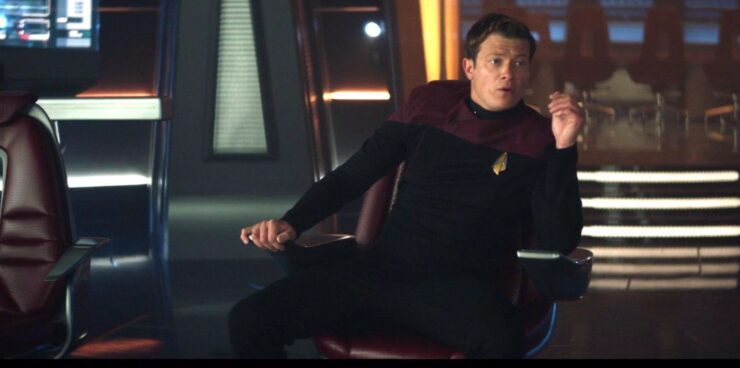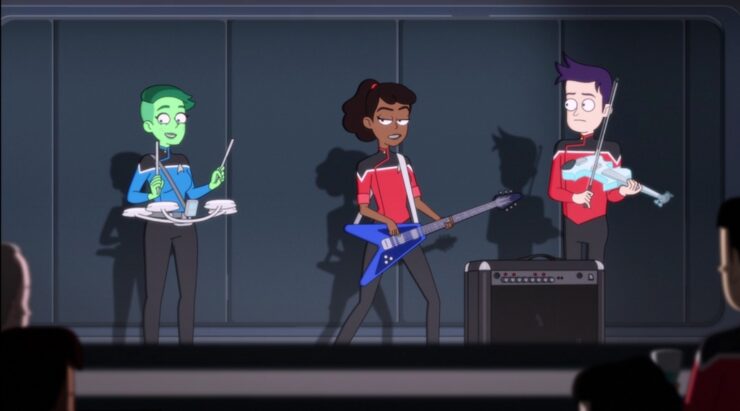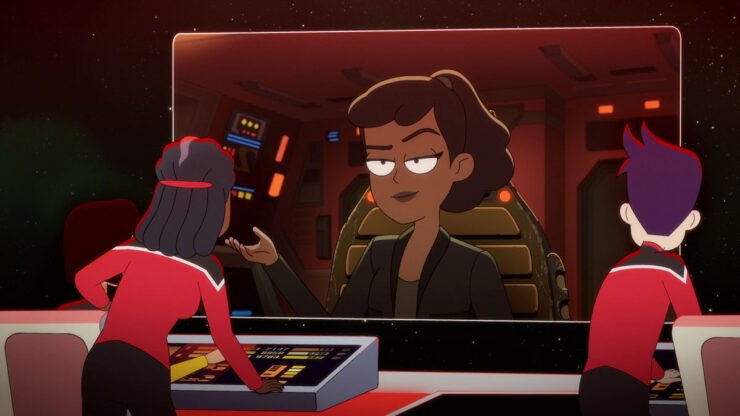If there is one ironclad law of Star Trek, it is this: Each new series, no matter how good it ends up being, will be received like a declaration of holy war by a certain extremely vocal subset of the fandom. When The Next Generation came out, they complained that it lacked Kirk and Spock; when Deep Space Nine came out, they moaned that the station didn’t go anywhere. They pilloried Discovery for being too action-heavy and Picard for being too sedate. But the furor was seldom more intense than it was when it was announced that the franchise’s ninth series would be an adult animated comedy.
After four successful and generally quite well-received seasons of Lower Decks, it’s almost difficult to believe that Paramount+ (then called CBS All Access) had to disable comments and hide the likes-to-dislikes ratio on its YouTube trailer. The animation was too Rick and Morty-ish! The ensigns were too goofy to belong in Starfleet! The trailer even featured (*gasp*) nudity, something of which Gene Roddenberry would surely never have approved! Surely this travesty would be a colossal flop! Surely Harve Bennett Rick Berman JJ Abrams Alex Kurtzman would be fired any day now for gross mismanagement of the franchise! Surely, surely, surely…
For my own part, however, I always knew that it was going to be good. Not because of the trailer, but because of who was writing it: Mike McMahan, showrunner of Rick and Morty, creator of Solar Opposites and—far more importantly—the man behind the infamous TNG Season 8 Twitter feed. In tweet after tweet of bizarre, hilarious imaginary episode summaries, he’d demonstrated to my satisfaction a deep understanding of what had made Star Trek: The Next Generation work as a series. The fact that he was being handed the keys to actual, canonical Star Trek was, of course, completely ridiculous—but also very, very welcome.
And I’m pleased to report that my faith was rewarded upon the series’ debut… mostly. Lower Deck’s premiere episode, “Second Contact,” wasn’t really anything to write home about, but it was perfectly serviceable as a pilot, rapidly introducing the premise, the setting, and even the basics of the Star Trek universe in general for anyone just joining us. But where it really shone was in its characters: Brad Boimler, whose ambition is matched only by his inexperience and neuroticism; D’Vana Tendi, an adorable scientist who’s delighted just to be there; and Sam Rutherford, who was clearly and explicitly patterned after Geordi La Forge and whom I therefore liked right away.
And then, of course, there was Beckett Mariner.
As the reader may have inferred from the title of this article, my initial impression of Mariner was not… good. Indeed, she rubbed me the wrong way pretty much from the moment that she drunkenly sliced Boimler’s thigh open with a rusty bat’leth a minute and a half into the premiere, and she did little to redeem herself in my eyes in the rest of the episode. Some of this is simply because there was no apparent follow-up to the aforementioned drunken thigh-slicing, something that—even given near-miraculous 24th-century medical technology—should almost certainly have resulted in a court martial. Part of it was that she managed to come across as kind of a jerk even when her illicit activity in the episode turned out to be a secret off-the-books humanitarian relief project. And of course the implication that she was only allowed to stay on the Cerritos because her mom was the captain and her dad an admiral did nothing to endear me to her: such blatant nepotism should have no place in the Star Trek future.

But if I had to lay my finger on just one thing that bugged me about Mariner, it would be this: she was Cool™.
This, perhaps, seems like an odd thing to complain about, but hear me out: there’s a world of difference between trend-setting characters who are organically cool because of how fans respond to them and trend-chasing characters who seem to have been designed by committee to tick off as many “Cool Guy” traits as possible; and Mariner, bless her heart, is relentlessly coded in the latter category. She has attitude! She disrespects authority! She rolls-up her uniform sleeves, plays sick riffs on the electric guitar, and gets black-out drunk on contraband whisky! When the character was unveiled at San Diego Comic Con in 2019, voice actor Tawny Newsome even described her as “a weirdo rock-and-roll party queen who just wants to ride her skateboard and eat her piece of pizza in peace, man.” Slap a pair of sunglasses on her and she’s basically Poochie the Rockin’ Dog from The Simpsons.

Subsequent episodes doubled-down on this characterization. True, Mariner got to have a “pet the dog” moment in “Envoys” when she deliberately engineered a situation in which Boimler got to save the day, but that only highlighted two further frustrations that I had with the character: (1) that the show kept trying to burnish her coolness by humiliating Boimler, and (2) that no matter how outlandish she appeared, she would inevitably be proven to have been right all along by the end of the episode. The nadir of both occurred in “Cupid’s Errant Arrow,” where Mariner became convinced that Boimler was incapable of attracting a hot girlfriend, and eventually discovered—over his naked, cockblocked, and unconscious body, of course—that he was infested with a parasite that made him irresistible to women.
It’s not until the seventh episode, “Much Ado About Boimler,” that the series started teasing the idea that there was more to Mariner than meets the eye, revealing that she actually used to be a brilliant, ambitious officer when she was fresh out of the academy, before something happened to make her the insubordinate slacker that we all knew and… well… knew. “Crisis Point” subsequently fleshed her out some more: here, Mariner vents her frustrations in a typically questionable manner by simulating the mass murder of the Cerritos crew on the Holodeck; however, as the episode plays out, we eventually learn that she hates herself more than she does anyone else. And as she literally tries to kill her own holographic doppelganger, she and the audience realise that her insubordinate jerk persona is just an act that she puts on because people have come to expect it; when the chips are down, she loves Starfleet, her mom, and her friends. Not coincidentally, “Crisis Point” is also the first episode where someone (in this case Tendi) calls Mariner out on her bullshit and has her admit wrongdoing and promise to do better by the end of the episode.
But for me, Mariner only truly clicked as a character in “An Embarrassment of Dooplers” midway through the second season. Here, she opts to “help” Boimler crash a Starfleet Command gala by posing as his own transporter duplicate, and—through an escalating series of poor decisions—manages to transform these innocuous shenanigans into a pitched car chase through a crowded space station with a trunk full of bubble bath and stolen disruptors. And it was at that point that I realised: as good as Mariner is at being a badass action hero… that’s literally all she knows. She’s the exact person you want by your side if you’re in a barfight with a gang of Nausicaan street-toughs or fleeing the dreaded spider-cow of Galardon; but if you just want to go to a boring command shindig, you’ll be lucky not to spend the night in jail. Beckett Mariner wasn’t just a one-dimensional awesome badass: she was a comprehensive attempt to imagine what someone who seemed like a one-dimensional awesome badass would be like if you actually met them as a real person.
The dark truth about coolness is that it’s frequently just a form of dysfunctionality that you don’t have the context to recognize. Television, more often than not, never gives you that context. In TV land, perennially spending your off hours getting wasted just means that you’re cool: in real life, it means you’re somewhere on the alcoholic spectrum. In TV land, constantly letting your fists do the talking means you’re a hero: in real life, it means that you have anger-management issues and quite possibly a death wish. And pushing all your friends away, as Mariner tends to in the process of cultivating her mystique (see for example “Mugato Gumato”), doesn’t make you a rugged individualist… it makes you a person with no friends. In Mariner, we get the context, and it’s not always pretty.
But the brilliance of Lower Decks is that, for all that it’s an adult animated comedy, it is, first and foremost, a Star Trek series; and so Mariner’s arc across the past two seasons has been about earnestly striving to improve herself with the love and support of her friends and family—together with their complete willingness to call her out on her shit if and when it does arise. Several times, she has become a prisoner of the very badass persona that she spent the first part of the series assiduously cultivating. During season 3, we the audience got to see her put in the work to be a better person…but her mother did not, and so, in “Trusted Sources,” immediately leapt to blaming her when a media exposé slagged the Cerritos and its crew, even though she was the only one who gave a uniformly positive interview. Captain Freeman’s rush to judgement was unfair—but we can’t really blame her for it, because it seems exactly like the kind of thing that first-season Mariner might have done. Meanwhile, her relationship with Jennifer Sh’Reyan ended in disaster when it turned out that Jennifer had only been attracted to her badass persona, and so was just as quick to blame her even though she, theoretically, should have known Mariner best. Even Boimler, we later learn, had assumed that she’d sabotaged the exposé, even though he was too much her friend to say so. Nevertheless, by the end of the season, Mariner had settled into a comfortable groove with the rest of the crew, and had become a good enough officer that, when she was promoted to lieutenant junior grade in the season four premiere, it felt justified.
Buy the Book


System Collapse
But self-improvement is rarely a monotonic process, particularly when the underlying source of one’s problems remains unaddressed, and so a substantial part of season four is about Mariner’s backsliding. Her insubordinate badass persona, we find, was not chosen by accident, but as a response to trauma—the trauma of losing her best friend and idol from her academy days, Sito Jaxa (introduced in TNG’s “The First Duty” and killed in action in TNG’s eponymous episode “Lower Decks”). Thus, Mariner’s promotion induces a shame spiral in her, first because Sito never advanced beyond ensign and, to a greater extent, because the higher she ascends in rank, the greater the likelihood that she, like Sito’s superiors, will eventually need to order someone to their death. The badass persona is thus an elaborate effort at self-sabotage: every time Mariner starts to ascend in rank, she gets herself busted back down to Ensign. And when it turns out this time that Commander Ransom knows her too well to let her get away with it, she becomes worse than ever before, engaging in outright stupid, death-seeking behaviour.
When this backstory was first revealed in “The Inner Fight,” I must admit I had some difficulty with it. It does, admittedly, explain a great deal about her behaviour, but I found it difficult to believe that Mariner could have been carrying this trauma around with her for more than a decade without anyone helping her—especially given that “Empathalogical Fallacies” took pains to show that Starfleet takes a wholistic approach to its officers’ well-being. But the more that I thought about it, the more that I realised that her friends and family did try to help her; she was only on the Cerritos in the first place because her mother was actively trying to save her career, and her friends did everything that they could to protect her from her own recklessness. But even a therapist can only help someone to the extent that they are willing to be helped, and here again Mariner’s own badassery becomes a prison: she can’t get help without exposing her vulnerability, and that is something that she’s pathologically unwilling to do. With this in mind, as much as I love that Mariner’s friends and family are there for her, I adore the fact that it is ultimately an opponent—Ma’ah, who, as a Klingon warrior, is himself no stranger to death, duty, or stupid, death-seeking behaviour—who is finally able to get her to open up and, by so doing, talk some sense into her.
Over the four seasons of Lower Decks, Beckett Mariner has grown from a stale caricature into a fully realised individual. Her arc has first deconstructed and then reconstructed what it means to be a hero, and shown that we can all learn to be better than we are—just so long as we are willing, and we have a community of people who are willing to help us be better. I have previously lamented the decline of utopianism in contemporary Star Trek, but in this, I think that Lower Decks is being just about as positive towards humanity as Star Trek has ever been. And if you asked me now who my favourite character on the series was…I would probably still say Tendi or Rutherford (or T’Lyn), but Mariner would be right up there too. And I’m fascinated to see where they take her from here.
Jaime Babb is a writer, editor, and lapsed physicist currently living in Montreal. She can be followed on Tumblr at quasi-normalcy.tumblr.com.










